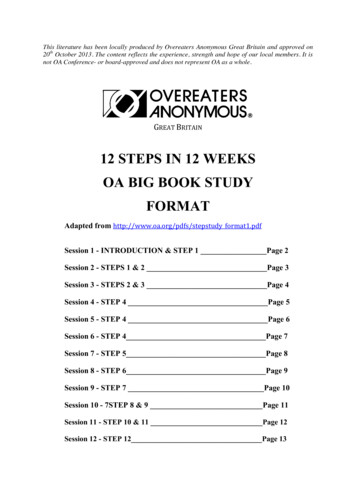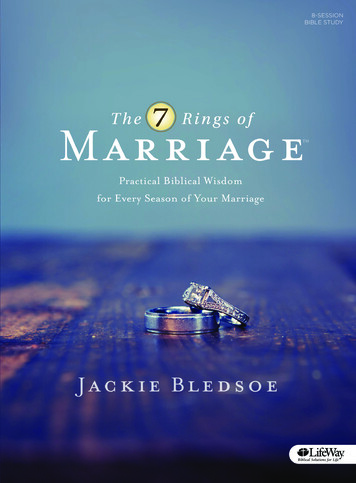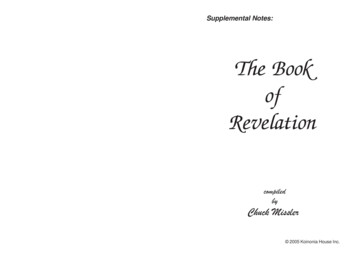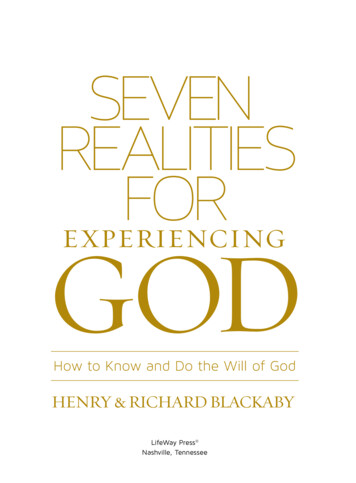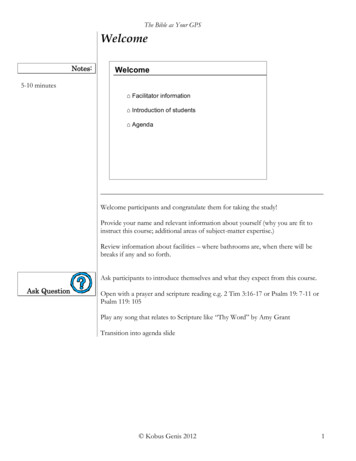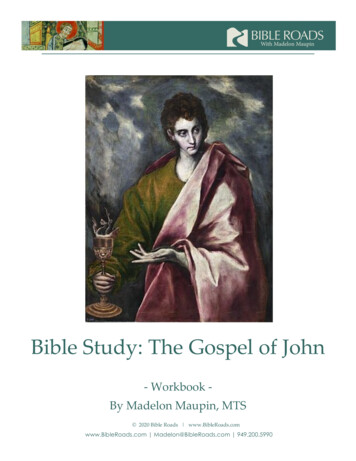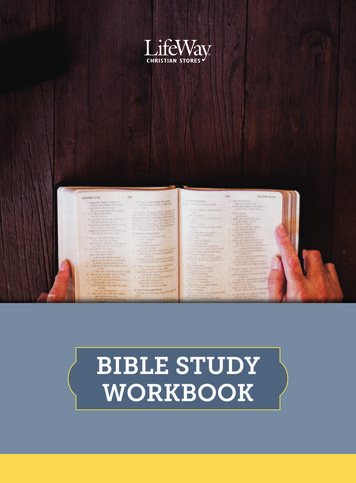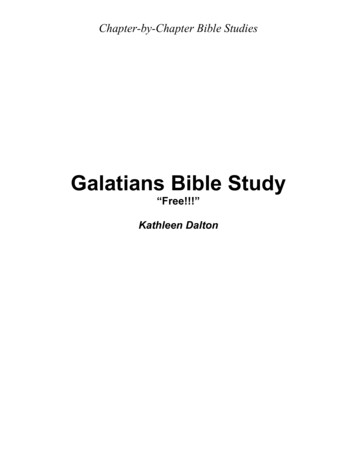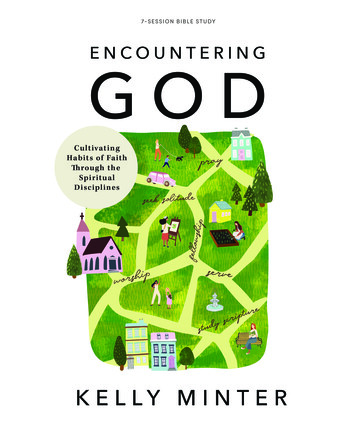
Transcription
7- S E S S I O N B I B L E ST U DY
Lifeway Press Nashville, Tennessee
EDITORIAL TEAM,LIFEWAY WOMENBIBLE STUDIESBecky LoydDirector,Lifeway WomenPublished by Lifeway Press 2021 Kelly MinterNo part of this book may be reproduced or transmitted in any form or by any means,electronic or mechanical, including photocopying and recording, or by any informationstorage or retrieval system, “except as may be expressly permitted in writing by the publisher.Requests for permission should be addressed in writing to Lifeway Press ; One Lifeway Plaza;Nashville, TN 37234.ISBN: 978-1-0877-3041-7Item: 005829509Tina BoeschManager, LifewayWomen Bible StudiesSarah DossLifeway Women BibleStudies Team LeaderMike WakefieldContent EditorErin FranklinProduction EditorLauren ErvinArt DirectorDewey decimal classification: 234.2Subject heading: DISCIPLESHIP / SPIRITUAL LIFE / FAITHUnless otherwise noted, all Scripture quotations are taken from the Christian Standard Bible ,Copyright 2017 by Holman Bible Publishers. Used by permission. Christian StandardBible and CSB are federally registered trademarks of Holman Bible Publishers. Scripturequotations marked (ESV) are from the ESV Bible (The Holy Bible, English StandardVersion ), copyright 2001 by Crossway, a publishing ministry of Good News Publishers.Some Scripture quotations are from THE MESSAGE. Copyright by Eugene H. Peterson1993, 1994, 1995, 1996, 2000, 2001, 2002. Used by permission of NavPress. All rights reserved.Represented by Tyndale House Publishers, Inc. Scripture quotations marked (NIV) are takenfrom the Holy Bible, New International Version , NIV .Copyright 1973, 1978, 1984, 2011by Biblica, Inc. Used by permission of Zondervan. All rights reserved worldwide. www.zondervan.com. The “NIV” and “New International Version” are trademarks registered in theUnited States Patent and Trademark Office by Biblica, Inc. Scripture marked NKJV takenfrom the New King James Version . Copyright 1982 by Thomas Nelson. Used by permission. All rights reserved.To order additional copies of this resource, write Lifeway Resources Customer Service;One Lifeway Plaza; Nashville, TN 37234; FAX order to 615.251.5933; call toll-free800.458.2772; email orderentry@lifeway.com;or order online at lifeway.com.Printed in the United States of AmericaLifeway Resources,One Lifeway Plaza,Nashville, TN 37234
TA B L E O F C O N T E N T S5ABOUT THE AUTHOR6A WORD FROM KELLY8SESSION ONE: INTRODUCTION10SESSION TWO: STUDY42SESSION THREE: PRAY78SESSION FOUR: EXPRESS112SESSION FIVE: QUIET142SESSION SIX: SIMPLIFY172SESSION SEVEN: ENGAGE206LEADER GUIDE210RECIPES216ENDNOTES 3
4EN COUNTER I N G G OD
ABOUT THE AUTHORKelly is passionate about God’s Word and believes it permeates all of life. Thepersonal healing and steadfast hope she’s found in the pages of Scripture fuelsher passion to connect God’s Word to our everyday lives. When she’s not writingor teaching, you can find her tending her garden, taking a walk with friends,cooking for her nieces and nephews, riding a boat down the Amazon River, orwalking through a Moldovan village with Justice & Mercy International (JMI).Kelly’s love for teaching Scripture led her to create her Cultivate Event, an eventcentered around Scripture, worship, prayer, and mission. She is also the host ofthe Cultivate podcast, a weekly podcast where she teaches the Bible in a conversational and approachable setting.Kelly’s past Bible studies include Finding God Faithful: A Study on the Life ofJoseph; No Other Gods: The Unrivaled Pursuit of Christ; All Things New: A Studyon 2 Corinthians; What Love Is: The Letters of 1, 2 & 3 John; Nehemiah: A HeartThat Can Break; and Ruth: Loss, Love & Legacy. Kelly is also a singer-songwriterwhose latest project is “Hymns & Hallelujahs.”Don’t miss accompanying Kelly down the Amazon River on an unforgettable journey in her memoir, Wherever The River Runs: How a ForgottenPeople Renewed My Hope in the Gospel. Kelly partners with Justice & MercyInternational, an organization that cares for the vulnerable and forgotten withthe love of Jesus in the Amazon and Moldova. To find out more about JMI, visitjusticeandmercy.org/cultivate. And to learn more about Kelly’s Bible studies,books, music, and speaking schedule, visit kellyminter.com. 5
A W O R D F R O M K E L LYHere we are. At the beginning of a study on spiritual disciplines. Perhaps just the worddiscipline makes you want to sprint for the hills. Don’t we all have enough to do already?Can’t we just breathe? I understand this. We’re absurdly busy, and life is a world-classjockey making us gallop to the pace of its whip. We want a nap, not more disciplines. Butwhat if we discovered that practicing the spiritual disciplines can create more margin inour lives? What if we find that they’re designed to instill peace, communion, and rest forour souls? What if we’re not out of time—our priorities are just out of whack?Somewhat surprisingly, I’ve found the spiritual disciplines to be liberating instead ofcumbersome. We naturally think that piling on additional activities will only burden usfurther, yet practicing the spiritual disciplines daily reminds us that it’s God we submitto, not life’s relentless demands. This will require some effort on our part, but anythingof value typically does. While absolutely nothing can be accomplished outside of God’sgrace and His Spirit, I sense we’ve adopted the misleading notion that we’re supposed towork hard for all the “normal” things in our natural life, but our spirituality is supposedto just somehow happen. You know, by the power of the Spirit. We want God to transformus into His image. We want to sin less and serve more. We want to live generously and letgo of our anger and cease worrying and have more peace, but we want God to snap Hisfingers and will it into existence.We have little idea how to participate with Him or where to begin. We hope to achievespiritual maturity the way Elisha scooped up Elijah’s mantle that had literally fallen out ofthe sky (2 Kings 2:1-13). But when we go to Scripture, when we go to church history, wesee that God very much invites our effort, our activity, our doing certain things in orderto participate in our transformation. I fear that in our desire to rightly emphasize a godlyposture of being, we have left out the biblical necessity of doing. This is where the spiritualdisciplines come in.Simply put, a discipline is “any activity I can do by direct effort that will eventually enableme to do that which, currently, I cannot do by direct effort.”1 Like a piano player whoroutinely practices her scales or a marathon runner who daily trains, eventually a run of6EN COUNTER I N G G OD
notes turns into a recital of Beethoven, and 5 miles turns into 26.2. This is also true as itrelates to being followers of Christ. The spiritual disciplines of solitude, prayer, Bible study,simplicity, worship, celebration, and more train us to do what we previously could not doas it relates to being conformed into the image of Jesus. The spiritual disciplines invite us,by God’s grace, to change. They give us hope in our place of stuckness.As we begin this adventure together, the key is to not get overwhelmed. Not all thespiritual disciplines can, or should be, practiced all at once. If we rested all the time, we’dnever serve anyone. If we only studied Scripture, we wouldn’t have time for prayer. And ifwe focused only on simplicity, when would we ever celebrate with a five-course meal wemade from scratch? So there are times and places for each of the disciplines. Some will bedaily habits such as Bible study, Scripture meditation, prayer, and worship. Others will bepracticed at special times or in certain seasons, like when we fast, serve on a mission trip,or enter into solitude. Most of the spiritual disciplines are so closely related it’s hard toknow where one stops and the other begins. As we move in and out of the disciplines, it’sless like turning off one road and onto another and more like a road changing names inthe middle of the one you’re already on. They’re all part of the same path, and they all leadto the same Person, Jesus.My hope is that through this study we’ll learn what the Bible has to say about the spiritualdisciplines. This understanding will give us the why behind these life-giving practices,which will inspire us toward implementing them into our daily lives. Above all, we’lldiscover that all those things about ourselves we think are impossible to change really canchange. We’re not stuck. Being transformed into the image of Christ is a practical reality—if we’re willing to participate with Him through the blessing of discipline.Kelly Minter 7
S ESSIO N O N E8EN COUNTER I N G G OD
GROUP TIMEWATC H SESSION ONE V ID E ODIS C USSION Q UESTIONSWhat drew you to this study on spiritual disciplines?When you think about spiritual disciplines, what comes to mind?How are the spiritual disciplines more about relationship thanresults? What happens if we make them just about results?How do you think spiritual disciplines help us orientour lives around what really matters?Take a quick look at the table of contents (p. 3). Which of thedisciplines listed there are you most interested in? Why?What do you hope to gain from this study?Video sessions available for purchase or rentat lifeway.com/encounteringgod#EncounteringGodStudy9
S ESSIO N TWO10EN COUNTER I N G G OD
J O UR N A LIN G THE SE SSIONUse this page throughout your session of study. We’ve given you some prompts, but feel free to writeother thoughts and questions to help you learn and process the spiritual discipline of Bible study.Before you start your work this session, journal some of your thoughts about thediscipline of Bible study. How have you practiced this discipline in the past? Whathas hindered your study of Scripture? What do you hope to get out of this session?SESSION TWOP RE PA R ING FO R T H E S E SS IO ND URI N G T H E S E SS IO NWhat are some key things you’re learning this session about the discipline of Bible study?RE V I EW ING T H E S E SS IO NWhat are your biggest takeaways from this session, and how will you put them intopractice?11
Session Two IntroductionWhen it comes to studying the Bible, one of thefirst things we can get awfully excited about is thatthe God of the Bible is a speaking God. Since Godis a speaking God and has spoken to us throughHis Word, studying the Bible is a thrilling endeavor.I did not say an easy one or even always a happyone—when I was in high school I flung my KingJames Version of the Bible across my bedroombecause I was so mad at God for what He wassaying to me. (Incidentally, the Bible also addressesanger, which ratcheted me up even more.) Whenwe recognize that God still reveals Himself to usin our current day and speaks to us personally,studying the Bible becomes less of a dry disciplineand more a living, breathing relationship where wecommune with the living God. I can say withouthesitation that meeting God through the pagesof Scripture has been a dynamic journey that hastouched every corner of my life. It has left no partof me alone.people and our world through Jesus Christ. It iswithin this story that our own stories find meaning.So it is my highest honor to invite you to begin ourstudy on the spiritual disciplines with perhaps themost foundational discipline of all, the study ofScripture. It’s not that studying the Bible is moreessential to our spiritual growth than say, prayer orworship, as much as it’s the window through whichGod’s light shines on all the other disciplines.Because understanding the Scripture is so foundational to every other spiritual discipline, we’ll giveour first full week to Bible study.So we must take care to interpret God’s Wordfaithfully and accurately. This practice is sometimes referred to as hermeneutics. The term“describes the principles people use to understandwhat something means, to comprehend whata message—written, oral, or visual—is endeavoringto communicate.”1 Simply put, hermeneuticsmeans faithfully interpreting what the Scripturesmean. To do this well, we ask certain questions:Who is the author of the book we’re studying (ifknown)? Who was it written to? When was itwritten? What was the culture like at the time?Asking these questions to understand the Bible’soriginal context can help us best know what itmeans in our own context. This is one of theThough the Bible is a single book, it’s alsoa collection of inspired writings. The canon ofScripture includes sixty-six books written overthousands of years by a variety of authors wholived in different places at different times, many ofwhom spoke different languages. While hundredsof stories are found within the books of the Bible,they all contribute to a single story: the grandnarrative of God’s creation, humanity’s rebellionagainst Him, and His promised redemption of His12EN COUNTER I N G G ODBut meaning doesn’t necessarily mean all about me—though I’ve often wished it were so. For the longesttime, I approached the Bible looking for a word forthe day or an answer to a pressing need. Should I sayyes to this opportunity? Should I buy this house orthat? The mountains or the beach for vacation? (Ofcourse, the mountains.) While I believe God speaksto us in specific and sometimes downright unexplainable and supernatural ways, the Bible’s meaning isn’tup for grabs. There may be many ways to faithfullyapply certain passages and the meaning of suchpassages may be layered. But when we read throughthe Bible, one thing is clear: God spoke, and we weremeant to understand His message. We’re not to makeHis message into what we want it to be or what ourcurrent culture thinks it should be or what socialmedia posts say it means. This is enormously freeing.When we read through the Bible, onething is clear: God spoke, and we weremeant to understand His message.
beautiful and timeless aspects of Scripture—understanding the original context doesn’tlessen its meaning or application in our modern day; rather it bolsters it by opening oureyes to how others experienced the living God in their time.Another important question to ask as we go along is: What kind of literature is the book I’mstudying? For instance, the Old Testament includes books of Law, History, Poetry, Wisdom,and Prophets. The New Testament includes the Gospels, Acts, Epistles, and Revelation.We read each of them differently for the sake of interpreting them most accurately. If wetake the metaphors of Psalms literally, we may find ourselves “making our beds in hell,”which I really don’t want anyone to try. If we’re looking in the history books for a stepby-step approach to a healthy marriage, Solomon with his thousands of wives may not bethe place to search. Knowing the Epistles are letters written by specific authors to specificindividuals or churches helps us know that certain exhortations need to be contextualized—in our culture, for instance, greeting one another on a Sunday morning with a “holykiss” might be a bit of a problem for pretty much . . . everyone.While at first the contents of this introduction seem like a lot to consider, these principles will serve as aids and guardrails to make studying the Bible easier and clearer. We’llactually get to practice a little hermeneutics this week as we study what the Bible has tosay about itself. We’ll let Scripture interpret Scripture. We’ll take into account the typeof literature we’re studying, depending on the passage. I’ll employ a few simple tools likeword dictionaries and commentaries to deepen our insight. And, most importantly, we’lllook at every passage in its own context and within the larger context of Scripture. Ifyou’re overwhelmed, don’t be!The whole purpose of this week’s study is to further acquaint you with God’s Word andgive you more tools in your belt to study it. This week isn’t about how much you alreadyknow or how sharp your Bible skills are. It’s about incorporating the tried and true practices of centuries of Christ-followers who found that certain disciplines created the bestconditions for drawing close to our Savior. As we begin this adventure, we’ll continuallykeep in mind that Bible study is not an end in itself. Listen to what Jesus said to some ofthe religious leaders of His day who knew the Scriptures inside and out, “You pore overthe Scriptures because you think you have eternal life in them, and yet they testify aboutme. But you are not willing to come to me so that you may have life” (John 5:39-40).Ultimately, we practice the spiritual discipline of Bible study so we might know, love, andserve the Word made flesh, Jesus Christ. Whether you’re a Bible study veteran or brandnew to Scripture’s pages, its treasures are inexhaustible.stu dy13
DAY 1STU DYA Speaking GodI think a new world will arise out of the religiousmists when we approach our Bible with the ideathat it is not only a book which was once spoken,but a book which is now speaking.2A. W. TOZEREarly this morning I took a walk around my neighborhood. Redbud trees lineseveral of the streets, and they delight me so, especially when they bloom purplemegaphones announcing to the world that spring is here. The strip of grass on thestreet-side of my sidewalk isn’t wide enough for me to plant my own. Otherwise I’dhave a row of waving redbuds greeting you upon arrival. That skinny sidewalk stripof grass is the one downside to my street.Today on my walk I noticed a single languishing redbud in a row of thriving ones.The ones flanking it were several feet taller and vibrantly stretching upward; theflagging tree had a mere two branches growing mostly sideways. Cast in the shade oftowering branches whose leaves blocked the sun, I realized the struggler was failingbecause it didn’t have the light it needed to thrive. Hmmm, I thought to myself,nature is hitting close to home today, and trees aren’t supposed to meddle like that.When other activities and busyness crowd out the time I need to hear from God, mygrowth is stunted, spiritually and otherwise. After all, God’s Word is more gloriousand penetrating than the sun, said the psalmist in Psalm 19. And when God’s lighttransforms our hearts, I like to think we bloom like redbuds.As we begin this session’s homework on the study of God’s Word, I can’t help butstart with a foundational passage in 2 Timothy.Read 2 Timothy 3:14-17.In Paul’s letter to Timothy, he listed various things for whichScripture is useful or profitable (v. 16). What are they?Who inspired or “breathed out” Scripture, and why shouldthis cause us to prioritize studying the Bible (v. 16, ESV)?14EN COUNTER I N G G OD
The New Testament hadn’t been compiled in Paul and Timothy’s day.So when Paul referred to “all Scripture” (v. 16) what must he have beenreferring to?What did Paul tell Timothy the “sacred Scriptures” (v. 15) are able to do?So this is really interesting. When you consider that our New Testament didn’t exist in Pauland Timothy’s day, you realize the reference to the “sacred Scriptures” is a reference to the OldTestament. Yet here Paul attached the Old Testament to Jesus.PER S O N AL TAK E How do you think the Old Testament gives us wisdomfor salvation through faith in Jesus?This passage reminds us that studying the thirty-nine books of the Old Testament is as importantas studying the twenty-seven in the New. This doesn’t mean the Old Testament gives us everythingwe need to know, but understanding it is vital to fully grasping the messages and promises of theNew Testament.Today we’ll look at a portion of the “sacred Scriptures” Timothy knew well, the ones Paul urgedhim to continue in. We’ll begin in Exodus, the second book of the Bible. But first a little context: Inthe Book of Genesis, we see that God spoke to Adam and Eve, and later to Noah, Abraham, Isaac,Jacob, and Joseph. After God delivered Israel from Egypt, He spoke corporately to His chosen peoplethrough His servant Moses. As we consider the spiritual discipline of Bible study, beginning withGod’s instructions to Israel is an important and foundational place to start. (This is also a principle ofhermeneutics: going to the early pages of Scripture to see what is said about a given matter.)Read Exodus 19:1-6.In this instance, what did God want the Israelites to do before anything else(v. 5)? (Circle the correct answer.)ActListenWorshipRepentstu dy15
Sometimes we speak for trivial reasons, but God spoke because He had something vital to say toHis people and wanted them to listen.Read Exodus 20:1-2.How did God reveal His personal nature to the Israelites before givingthem the Ten Commandments?What does this tell us about God’s heart behind His commands?If you thought the Ten Commandments were a lot to keep up with, God followed them up with anadditional 603 laws for a grand total of 613—and I thought growing up in a strict private schoolwas rough at times. The whole of these laws is referred to as Torah, the Hebrew word for law, andis contained in the first five books of the Old Testament, also known as the Pentateuch. (Note:When you see words in Scripture like law, precepts, instruction, or commands, more than likely theauthor is referring to the whole of the Torah.)Sadly, the English translation law doesn’t give us the most accurate impression of God’s commandsbecause it tends to steer our minds toward rules, prohibitions, and restrictions. However, theHebrew word Torah is full of positive connotations about how God intended His people to thrive inthe promised land.3 Dr. John Sailhamer described it wonderfully, “What the man and woman lostin the Garden is now restored to them in the Torah, namely, God’s plan for their good” (emphasismine).4 Did anyone need to hear that today? God’s laws are for our benefit and blessing.PER S O N AL R E F L E C T I O N Describe a specific way that God’s instruction inyour life has been for your good, especially if that instruction went against thegrain of your natural inclinations.16EN COUNTER I N G G OD
When we study God’s Word and walk according to it, through the power of His Spirit, we’re literallyrestoring the abundant life that was once ours in the garden. Sailhamer’s words remind me thatGod’s Word is not static but transformative in its power to change us (2 Cor. 5:17; Col 3:10)!PER S O N AL R E F L E C T I O N When you think of the Old Testament and God’sLaw in particular, do you have a positive or negative view? Explain.How has what you’ve learned so far caused you to think differently?Read Deuteronomy 4:1-14.Deuteronomy begins with Moses addressing the people of Israel before they crossed the JordanRiver into the promised land. He rehearsed the commands God gave them at Mount Sinai (Ex. 20),because at this point, the Israelites had spent the last forty years wandering in the wilderness asa result of their disobedience. As they prepared to enter the promised land, God had a lot to tellthem through Moses.What did Moses do with the commands God had given Israel (vv. 1,5,14)?(Circle the correct answer.)Hid themPassed them outRecited themTaught themPER S O N AL TAK E If it was important for Moses to teach God’s Word to thepeople, what does that tell us we’ll need along the way as we study Scripture?stu dy17
PER S O N AL R E F L E C T I O N Moses told the Israelites not to add or take awayfrom God’s commands (v. 2). How do you see these errors happening today?Taking away from God’s Word:Adding to God’s Word:God’s people were to listen to and follow God’s words so that theymight , , and(v. 1).What other reason did Moses give for keeping God’s commands inverses 6-7?What does verse 8 infer about the laws of Israel’s surrounding nations?It’s natural to think of the Ten Commandments and the subsequent 603 laws as out of touch andantiquated. But we often don’t realize how ahead of their time they were and to a large degree stillare. While other ancient nations were lawless and hopelessly lived at the mercy of their false gods,God had given His people instruction for flourishing. The Law revealed how Israel could live atpeace with God, each other, and even the foreigner in their midst.18EN COUNTER I N G G OD
PER S O N AL R E F L E C T I O N As Israel was to stand apart from other nations, sowe’re to be set apart today. This doesn’t mean we’re to be distant from peoplewho don’t know Christ but rather distinct in how we live. When we live by God’sWord, what differences do others see in our lives that might draw them toJesus? Name some specific differences.Only be on your guard and diligentlywatch yourselves, so that you don’tforget the things your eyes have seenand so that they don’t slip from yourmind as long as you live. Teach them toyour children and your grandchildren.DEUTERONOMY 4:9 (EMPHASIS MINE)Some translations use the word mind and others heart. That’s because the Hebrew word encompasses all of our being. It’s the “source of the life of the inner person . . . with a focus on feelings,thoughts, volition, and other areas of inner life.”5 Moses was clear: We’re to know what God hastold us, hold onto it with intent and care, and teach it to those coming behind us.PER S O N AL R E F L E C T I O N What excites you most about adding a regulardiscipline of Bible study to your life? What are your fears or concerns?I can’t wait to continue to trace the importance of God’s Word throughout the pages of Scripture. I’malready looking forward to tomorrow where we’ll take a look at the heart behind knowing the Word.stu dy19
DAY 2STU DYA Law of LoveOf one thing I am perfectly sure: God’s story neverends with “ashes.”6ELISABETH ELLIOTMy friend Hollis was in the neighborhood and did an old fashioned drop in. I love whenpeople spontaneously pop by (unless my house is a wreck or I’m still in my workoutclothes and my hair is up in a clip!). Goodness, when did everything get so structured?Not surprisingly, I was perched on my front porch when Hollis pulled up. It’s becomemy central office during the spring and summer, though I will say it’s not a great setupif you’re trying to focus. It seems that every twelve minutes or so I absolutely mustwater those barrels of roses in the back, steep another cup of tea, or drop everything forsomeone as remarkable as Hollis. Eighty-four years old and as charming as can be, Hollisreads the Scripture focus at our church on Sunday mornings. When the churches we separately attended merged together, he and I became fast friends, which led to him coachingme on how to swing a golf club (though that is an entirely different story).Sitting lazily in outdoor chairs, we caught up in the afternoon air. I shared some uncertainties about the future, questions about things I have no control over. He crossed hislegs and adjusted his sunglasses. Silence hung between us for a brief moment. “T and O,”he finally said. I nodded my head and smiled. I’d learned his abbreviation for “trust andobey.” “That’s all you can do,” he shrugged. At eighty-four, he’s let that truth play outthrough bliss and trial. It was just the reminder I needed. And today it’s the shorthandfor much of what we’ll be studying in the Book of Deuteronomy. While it doesn’t havenearly the ring to it, for our purposes I’m changing his acronym to, “T and O becausewe L.” I’ll explain the L part in a moment.Quick review from yesterday. What does the word Torah refer to?Thoughtfully read Deuteronomy 6:1-9.Verse 2 shows the correlation between fearing God (reveringand respecting Him) and doing what He says. How does obeyingGod’s Word reflect how much you revere Him?20EN COUNTER I N G G OD
In what place are God’s words to dwell (v. 6)? How is thissignificant to your life today?Verses 7-9 are gripping descriptions of how God’s words are to thread through our dailylives. When my nieces and nephews are in my home, when I’m having dinner withfriends, when I’m catching up with family, I want God’s view of life and His guidance inmy relationships to spill into every crevice of my day. Memorizing a list of rules doesn’taccomplish this; having God’s instructions live in my heart does.Based on verse 3, what was promised if the Israelites obeyed God?I want God’s viewof life and Hisguidance in myrelationships tospill into everycrevice of my day.Deuteronomy 6:4-5 is known as the Shema, which literally means “Hear!” and is to be takenas a command. In ancient Israelite tradition, the Shema became a daily, recited prayer.7Here’s the CSB version:Listen, Israel: The LORD our God,the LORD is one. Love the L ORDyour God with all your heart,with all your soul, and with allyour strength.When you see LORD in small caps in the Old Testament, it’s referring to Yahweh, thepersonal name by which God revealed Himself to His peopleWhy do you think it was important for the Israelites to know thattheir God was the one and only God of the universe? (Look backat Ex. 20:3-4 for clues.)stu dy21
When I skim social media feeds or catch the daily headlines on my phone, I’m reminded that thereare a lot of gods out there. To claim with certainty that you serve the one and only God of thisuniverse is increasingly polarizing. Yet this is exactly who God reveals Himself to be in the Shema.Yahweh is the single, one true God.What is the first word of the Shema, and why is it important?The interesting thing about the word listen or hear in this context is that it’s virtually synonymouswith obey. The expectation was that tuning in to God’s Word naturally meant you were preparing torespond to His leading. In other words, if you’ve really heard the one, true God, you’ll obey Him. Putanother way, if you say you’ve heard God but you don’t actually obey Him, then you haven’t reallyheard Him.8PER S O N AL R E F L E C T I O N Is there something you’ve heard God say throughHis Word but haven’t obeyed? If so, be honest with yourself and reflect onwhat’s holding you back. Then briefly note your plan of action, such as removinga specific obstacle in the way of obedience or taking a
The “NIV” and “New International Version” are trademarks registered in the United States Patent and Trademark Of


